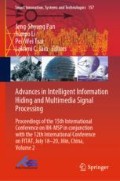Abstract
A feasible way to do a formative evaluation is to use peer assessment. In other words, students play the role of evaluators to evaluate the work submitted by others. However, the reliability of students’ rating is not guaranteed. Therefore, we propose a new strategy to design and develop an online peer assessment system to support the effective development of blended learning activities for engineering courses under the new situation. Empirical research shows that teachers and students are more satisfied with the system.
Access this chapter
Tax calculation will be finalised at checkout
Purchases are for personal use only
References
Gielen, S., Peeters, E., Dochy, F., et al.: Improving the effectiveness of peer feedback for learning. Learn. Instr. 20(4), 304–315 (2010)
Kollar, I., Fischer, F.: Peer assessment as collaborative learning: A cognitive perspective. Learn. Instr. 20(4), 344–348 (2010)
Speyer, R., Pilz, W., Kruis, J.V.D., et al.: Reliability and validity of student peer assessment in medical education: a systematic review. Med. Teacher 33(11), e572–e585 (2011)
Ueno, M., Okamoto, T., Nagaoka, K.: An item response theory for peer assessment. IEEE Trans. Learn. Technol. 9(2), 157–170 (2008)
Shu, C.: Design and optimization of online peer assessment system. E-educ. Res. (1), 80–85 (2017)
Bai, H., Su, Y., Shen, S.: An empirical study on a blended leaning model integrated peer review. E-educ. Res. 12, 79–85 (2017)
Sun, L., Zhong, S.: Probabilistic models of peer assessment in MOOC system. Res. Open Educ. 20(5), 83–88 (2014)
Xu, T.: Design of peer assessment in xMOOCs. Res. Open Educ. 21(2), 70–77 (2015)
Get the Java SSM framework development, https://www.imooc.com/course/programdetail/pid/59/. Accessed on 23 Dec 2018
Acknowledgements
This study was supported by the teaching reform Research project of Minjiang University under Grants No. MJU2018B044 and supported by Fujian Provincial Key Laboratory of Information Processing and Intelligent control.
Author information
Authors and Affiliations
Corresponding author
Editor information
Editors and Affiliations
Rights and permissions
Copyright information
© 2020 Springer Nature Singapore Pte Ltd.
About this paper
Cite this paper
Lin, Y., Lin, Y. (2020). Optimal Design of Online Peer Assessment System. In: Pan, JS., Li, J., Tsai, PW., Jain, L. (eds) Advances in Intelligent Information Hiding and Multimedia Signal Processing. Smart Innovation, Systems and Technologies, vol 157. Springer, Singapore. https://doi.org/10.1007/978-981-13-9710-3_23
Download citation
DOI: https://doi.org/10.1007/978-981-13-9710-3_23
Published:
Publisher Name: Springer, Singapore
Print ISBN: 978-981-13-9709-7
Online ISBN: 978-981-13-9710-3
eBook Packages: Intelligent Technologies and RoboticsIntelligent Technologies and Robotics (R0)

